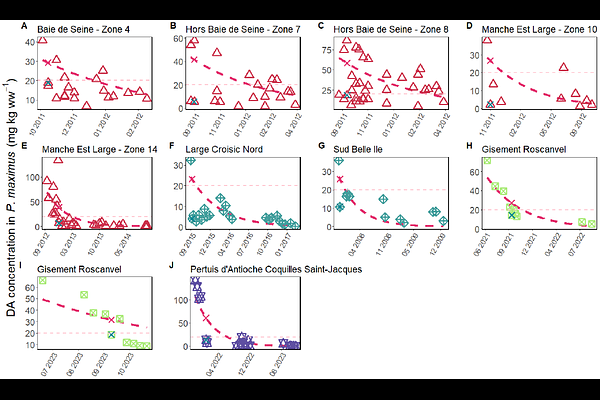A 20-years comparative study of domoic acid depuration in king scallops, Pecten maximus, across French provinces.

A 20-years comparative study of domoic acid depuration in king scallops, Pecten maximus, across French provinces.
Le Moan, E.; Derrien, A.; Fabioux, C.; Jean, F.; Lassudrie, M.; Terre-Terrillon, A.; Hegaret, H.; Flye-Sainte-Marie, J.
AbstractHarmful Algal Blooms (HABs) can lead to fishery closures when toxin levels in commercial species exceed regulatory thresholds. Domoic acid (DA), the neurotoxin causing Amnesic Shellfish Poisoning (ASP), is particularly persistent in king scallops (Pecten maximus), a commercially valuable species in France. This species is known for its slow depuration rate compared to other species. As a result, anticipating DA dynamics is therefore a key to managing fishery openings in autumn, especially following spring contamination events. This study used 20 years of data from the French phycotoxin in-situ monitoring programme (REPHYTOX) to identify contamination events along the French Atlantic and English Channel coastlines. Depuration rates were estimated for 104 events; however, no correlation was found between depuration rate and province, time period, initial DA concentration or environmental conditions. Consequently, a median depuration rate was defined and applied in a widely used exponential decay model. In response to professionals\' needs, we developed a user-friendly predictive tool that estimates DA concentrations in king scallops based on sampling in spring or summer. We recommend performing DA quantification in scallops whenever DA is detected in other shellfish at the same location, and running the predictive model to anticipate DA content at the opening of the fishery season in autumn. This tool will help fishery managers to anticipate bans, to avoid unnecessary licence purchases, or to shift to alternative species. While developed using French data, the methodology is adaptable to other regions, with appropriate adjustments to reflect local ecological, regulatory and fishery contexts.